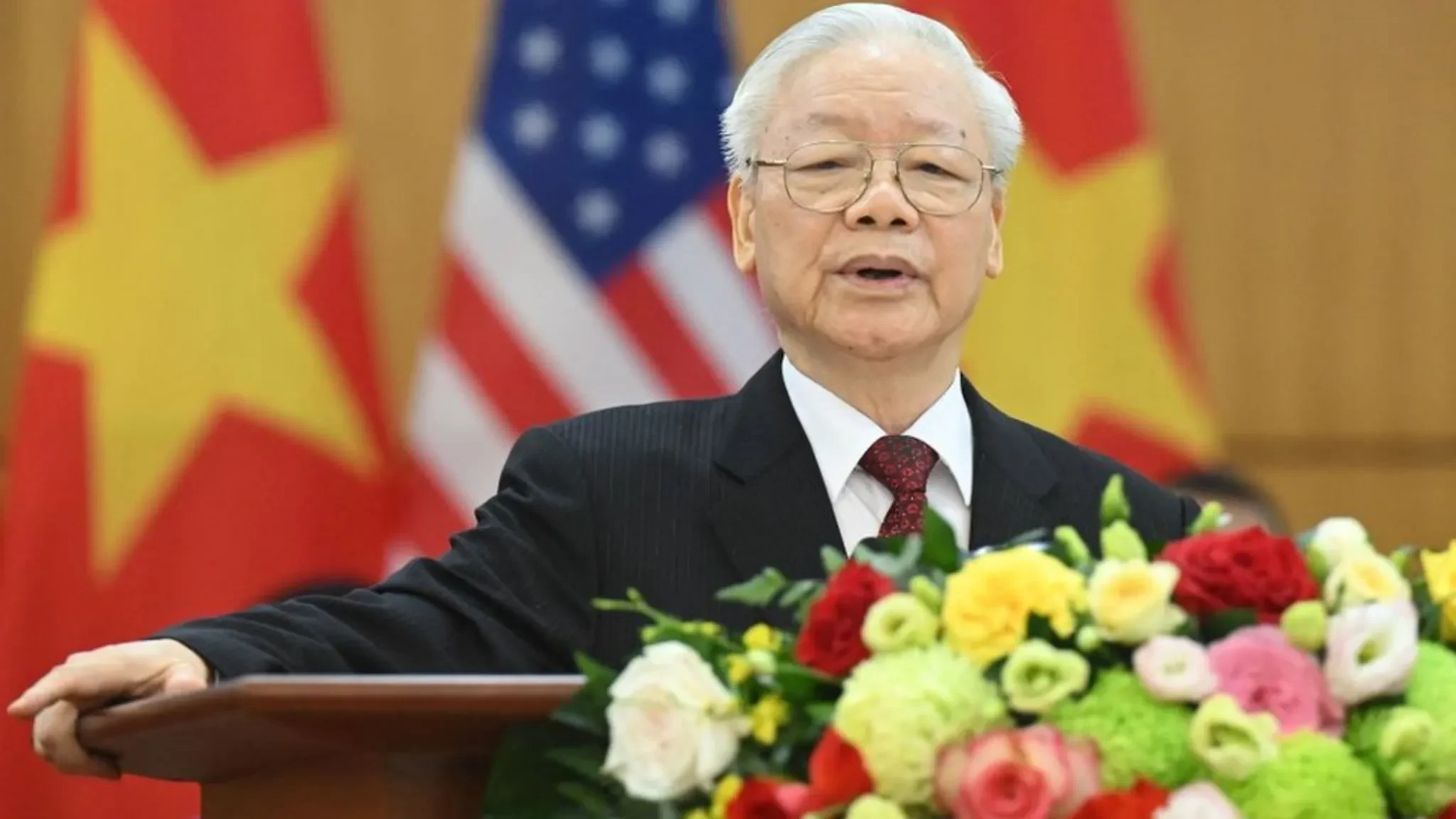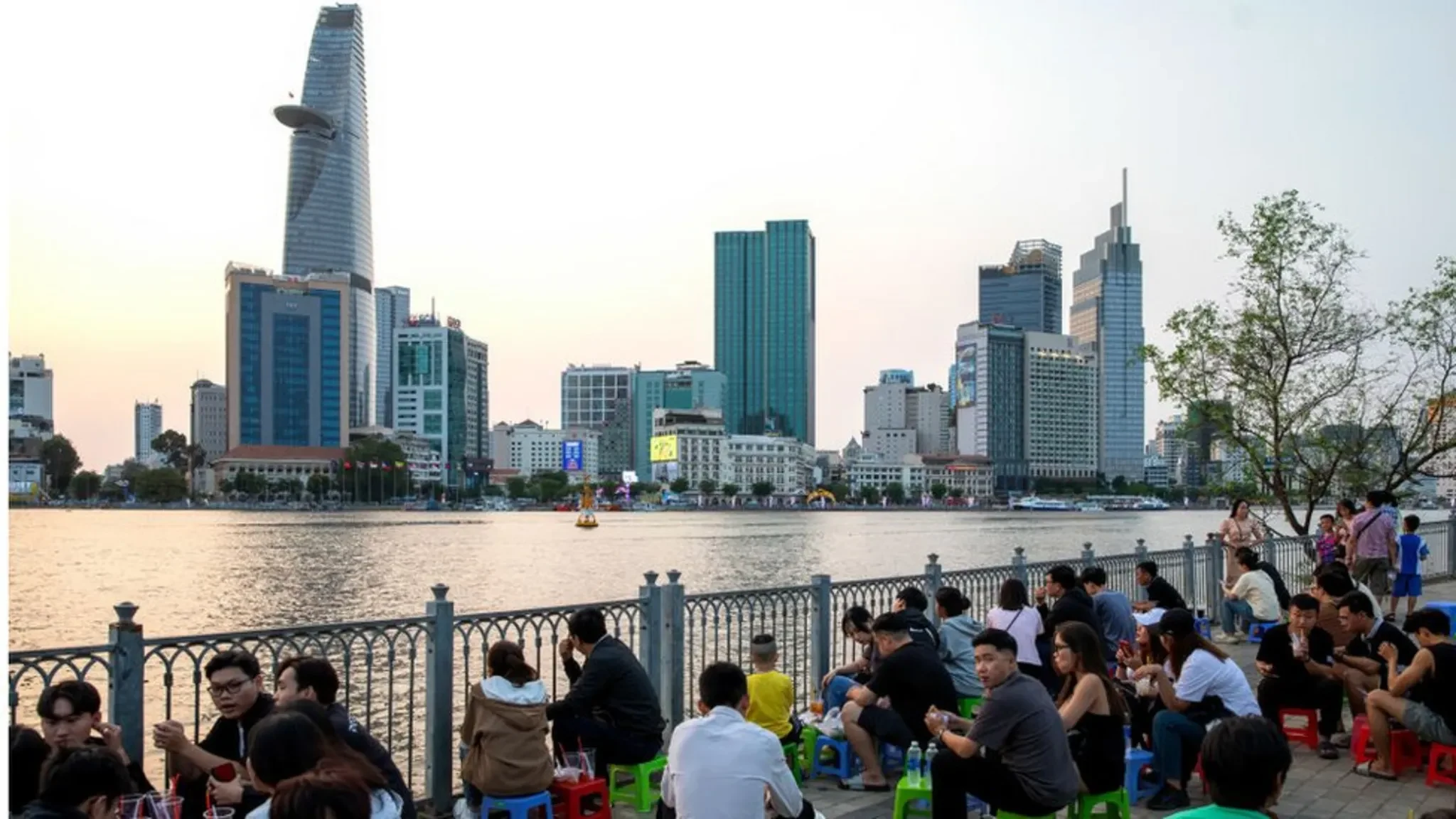- 16
- 15
- 2
- 7
- 9
- 27
A Texas gunman who called himself a “sovereign citizen” not bound by US laws was killed in a shootout with cops while livestreaming on Facebook.
Patrick Hurst, 47, told Harris County deputies who pulled him over for an expired registration and busted tailgate in Houston on Sunday that he would not comply with their orders because he was a member of the extremist movement that doesn't accept the legitimacy of government institutions.
He drove off soon after cops learned he had a possible open out-of-county felony warrant for evading police before he was stopped with spike strips.
Hurst then streamed on Facebook Live as he pulled a handgun and jumped out of his car to confront the pursuing officers — getting killed after firing first at the deputies, Sheriff Ed Gonzalez said.
Does WPD have the stream?
- 26
- 31
- 3
- 8
- 37
- 86
Truong My Lan: Vietnamese billionaire sentenced to death for $44bn fraud
Truong My Lan is accused of looting one of Vietnam's largest banks over a period of 11 years
It was the most spectacular trial ever held in Vietnam, befitting one of the greatest bank frauds the world has ever seen.
Behind the stately yellow portico of the colonial-era courthouse in Ho Chi Minh City, a 67-year-old Vietnamese property developer was sentenced to death on Thursday for looting one of the country's largest banks over a period of 11 years.
It's a rare verdict - she is one of very few women in Vietnam to be sentenced to death for a white collar crime.
The decision is a reflection of the dizzying scale of the fraud. Truong My Lan was convicted of taking out $44bn (£35bn) in loans from the Saigon Commercial Bank. The verdict requires her to return $27bn, a sum prosecutors said may never be recovered. Some believe the death penalty is the court's way of trying to encourage her to return some of the missing billions.
The habitually secretive communist authorities were uncharacteristically forthright about this case, going into minute detail for the media. They said 2,700 people were summoned to testify, while 10 state prosecutors and around 200 lawyers were involved.
The evidence was in 104 boxes weighing a total of six tonnes. Eighty-five defendants were tried with Truong My Lan, who denied the charges.
"There has never been a show trial like this, I think, in the communist era," says David Brown, a retired US state department official with long experience in Vietnam. "There has certainly been nothing on this scale."
The trial was the most dramatic chapter so far in the "Blazing Furnaces" anti-corruption campaign led by the Communist Party Secretary-General, Nguyen Phu Trong.
A conservative ideologue steeped in Marxist theory, Nguyen Phu Trong believes that popular anger over untamed corruption poses an existential threat to the Communist Party's monopoly on power. He began the campaign in earnest in 2016 after out-manoeuvring the then pro-business prime minister to retain the top job in the party.
Communist Party General Secretary Nguyen Phu Trong is leading an anti-corruption campaign
The campaign has seen two presidents and two deputy prime ministers forced to resign, and hundreds of officials disciplined or jailed. Now one of the country's richest women has joined their ranks.
Truong My Lan comes from a Sino-Vietnamese family in Ho Chi Minh City, formerly Saigon. It has long been the commercial engine of the Vietnamese economy, dating well back to its days as the anti-communist capital of South Vietnam, with a large, ethnic Chinese community.
She started as a market stall vendor, selling cosmetics with her mother, but began buying land and property after the Communist Party ushered in a period of economic reform, known as Doi Moi, in 1986. By the 1990s, she owned a large portfolio of hotels and restaurants.
Although Vietnam is best known outside the country for its fast-growing manufacturing sector, as an alternative supply chain to China, most wealthy Vietnamese made their money developing and speculating in property.
All land is officially state-owned. Getting access to it often relies on personal relationships with state officials. Corruption escalated as the economy grew, and became endemic.
By 2011, Truong My Lan was a well-known business figure in Ho Chi Minh City, and she was allowed to arrange the merger of three smaller, cash-strapped banks into a larger entity: Saigon Commercial Bank.
Vietnamese law prohibits any individual from holding more than 5% of the shares in any bank. But prosecutors say that through hundreds of shell companies and people acting as her proxies, Truong My Lan actually owned more than 90% of Saigon Commercial.
They accused her of using that power to appoint her own people as managers, and then ordering them to approve hundreds of loans to the network of shell companies she controlled.
The amounts taken out are staggering. Her loans made up 93% of all the bank's lending.
According to prosecutors, over a period of three years from February 2019, she ordered her driver to withdraw 108 trillion Vietnamese dong, more than $4bn (£2.3bn) in cash from the bank, and store it in her basement.
That much cash, even if all of it was in Vietnam's largest denomination banknotes, would weigh two tonnes.
She was also accused of bribing generously to ensure her loans were never scrutinised. One of those who was tried used to be a chief inspector at the central bank, who was accused of accepting a $5m bribe.
The mass of officially sanctioned publicity about the case channelled public anger over corruption against Truong My Lan, whose fatigued, unmade-up appearance in court was in stark contrast to the glamorous publicity photos people had seen of her in the past.
But questions are also being asked about why she was able to keep on with the alleged fraud for so long.
The trial took place in Ho Chi Minh City, where Saigon Commercial Bank was based
"I am puzzled," says Le Hong Hiep who runs the Vietnam Studies Programme at the ISEAS - Yusof Ishak Institute in Singapore.
"Because it wasn't a secret. It was well known in the market that Truong My Lan and her Van Thinh Phat group were using SCB as their own piggy bank to fund the mass acquisition of real estate in the most prime locations.
"It was obvious that she had to get the money from somewhere. But then it is such a common practice. SCB is not the only bank that is used like this. So perhaps the government lost sight because there are so many similar cases in the market."
David Brown believes she was protected by powerful figures who have dominated business and politics in Ho Chi Minh City for decades. And he sees a bigger factor in play in the way this trial is being run: a bid to reassert the authority of the Communist Party over the free-wheeling business culture of the south.
"What Nguyen Phu Trong and his allies in the party are trying to do is to regain control of Saigon, or at least stop it from slipping away.
"Up until 2016 the party in Hanoi pretty much let this Sino-Vietnamese mafia run the place. They would make all the right noises that local communist leaders are supposed to make, but at the same time they were milking the city for a substantial cut of the money that was being made down there."
At 79 years old, party chief Nguyen Phu Trong is in shaky health, and will almost certainly have to retire at the next Communist Party Congress in 2026, when new leaders will be chosen.
He has been one of the longest-serving and most consequential secretary-generals, restoring the authority of the party's conservative wing to a level not seen since the reforms of the 1980s. He clearly does not want to risk permitting enough openness to undermine the party's hold on political power.
But he is trapped in a contradiction. Under his leadership the party has set an ambitious goal of reaching rich country status by 2045, with a technology and knowledge-based economy. This is what is driving the ever-closer partnership with the United States.
Yet faster growth in Vietnam almost inevitably means more corruption. Fight corruption too much, and you risk extinguishing a lot of economic activity. Already there are complaints that bureaucracy has slowed down, as officials shy away from decisions which might implicate them in a corruption case.
"That's the paradox," says Le Hong Hiep. "Their growth model has been reliant on corrupt practices for so long. Corruption has been the grease that that kept the machinery working. If they stop the grease, things may not work any more."
- 3
- 17
- 1
- 3
- 28
- 55
!nooticers why is the AfD growing in popularity? 
Germany's transport minister is threatening to ban driving on weekends to meet climate goals if the ruling coalition does not pass reforms to the Climate Protection Act by July.
“The fact that the amendment is still not in force leads to considerable legal and factual uncertainties,” liberal politician Volker Wissing wrote in a letter to the parliamentary group leaders of the coalition, German outlet BILD reported Thursday.
“This serves neither the climate nor the reputation of the federal government," he said.
A reduction in traffic to help meet the climate goals would only be possible through measures that are difficult to communicate to the public, such as “comprehensive and indefinite driving bans on Saturdays and Sundays,” Wissing added.
The federal coalition government, made up of the center-left Social Democrats, the Greens and the liberal Free Democrats, has been at odds for months over issues including a payment card for refugees, Germany's debt brake and, lately, elephants.
The planned amendment to the emissions-reduction law allows climate goals to be reviewed for compliance by looking at all sectors together instead of individually. If the overall target is missed two years in a row, then the federal government is to decide in which sector and with which measures the permitted total amount of carbon dioxide emissions is to be achieved by 2030.
If the planned reforms are not passed through parliament by July 15, Wissing warned, the Ministry for Digital and Transport would be obliged to submit an "immediate action program that ensures compliance with the annual emission levels of the transport sector" until 2030 — which would include a driving ban on weekends.
Environmental organizations — including Greenpeace, the German Federation for the Environment and Nature Conservation BUND, and Fridays for Future — criticize the planned abolition of individual sector targets. They fear that an overall calculation obscures the impact of certain sectors — especially the traffic sector, which frequently doesn't meet targets.
"This claim is simply wrong," Green parliamentary group leader Julia Verlinden told the German Press Agency, referring to Wissing's threat of a weekend driving ban. She added that Wissing should not aggravate people unnecessarily because there are other ways to tackle climate issues, such as a speed limit.
The highway speed limit is a controversial debate in Germany. At the beginning of April, Wissing stressed that the government isn't looking to implement a speed limit on highways.
The FDP, the right-wing Alternative for Germany and the conservative Christian Democratic Union have spoken out against it. Wissing's party rejects any disproportionate bans on mobility” in its election program.
Greenpeace mobility expert Clara Thompson told the German Press Agency that the transport minister was “shamelessly” trying to distract from his his own failures.
“Wissing has wasted two years blocking every climate protection measure in road traffic — now he is coming up with horror scenarios so that he won't have to do anything in the future either," she said.
- 13
- 22
Red Lobster Considers Bankruptcy to Deal With Leases and Labor Costs
- Company working with King & Spalding for restructuring advice
- Owner Thai Union earlier wrote down its investment in business
Seafood restaurant chain Red Lobster is mulling a Chapter 11 bankruptcy filing as it looks to restructure its debt, according to people with knowledge of the matter.
Red Lobster has been getting advice from law firm King & Spalding, said the people, who asked not to be identified discussing a private matter. The dining chain is considering a possible Chapter 11 filing to shed some long-term contracts and renegotiate a swath of leases, the people said.
Red Lobster's cash flows have been weighed down by onerous leases and labor costs, among other issues. Restructuring discussions are ongoing and a final decision hasn't been made, they said. Filing for bankruptcy would allow the company to keep operating while it works on a debt-cutting plan.
Messages left with Red Lobster and King & Spalding were not returned.
Red Lobster traces its roots to a single restaurant in Lakeland, Florida in 1968, according to its website. The company introduced its popular cheese-flavored biscuits in 1992, and Red Lobster now boasts hundreds of locations across the US and Canada, along with international franchises.
The restaurant chain has gone through multiple owners and management changes in recent years. Thai Union Group Plc, which took control of the company in 2021, this year wrote down its stake in Red Lobster and said the company's “ongoing financial requirements no longer align with Thai Union's capital allocation priorities.”
Fortress Investment Group is a key lender to Red Lobster and is among those involved in current debt negotiations, the people said.
A representative with Fortress declined to comment.
Golden Gate Capital took over Orlando, Florida-based Red Lobster from Darden Restaurants through a leveraged buyout in 2014. Thai Union owned 25% of the chain before buying Golden Gate's stake in 2021.
- 7
- 23
- 4
- 11

- 10
- 14
At least it prevented her from getting long COVID  . If she did she might accept the MAID like this other foid
. If she did she might accept the MAID like this other foid
https://nypost.com/2023/12/14/news/canada-woman-with-long-covid-applies-for-assisted-suicide-report/
- 2
- 13
- 9
- 11
















 to see the moon and the stars' on the night
to see the moon and the stars' on the night  he's accused of butchering four students | Daily
he's accused of butchering four students | Daily  Mail Online
Mail Online 

 man.
man.










 in two places while sleeping
in two places while sleeping  | Science
| Science  | News | Express.co.uk
| News | Express.co.uk




 Diversity Is Our Strength
Diversity Is Our Strength 
 for mediocre seafoodcels. Red Lobster is considering filing for bankruptcy
for mediocre seafoodcels. Red Lobster is considering filing for bankruptcy 




 Bill Would Let People
Bill Would Let People  Sue Grocery Stores for Closing Too Quickly
Sue Grocery Stores for Closing Too Quickly



 mother paralyzed after COVID-19 booster
mother paralyzed after COVID-19 booster  refuses two offers of MAiD
refuses two offers of MAiD 


 to Save Herself from a Monkey
to Save Herself from a Monkey  Attack
Attack 


 shooting
shooting





 House passes bill banning sale of semi-auto firearms
House passes bill banning sale of semi-auto firearms 








